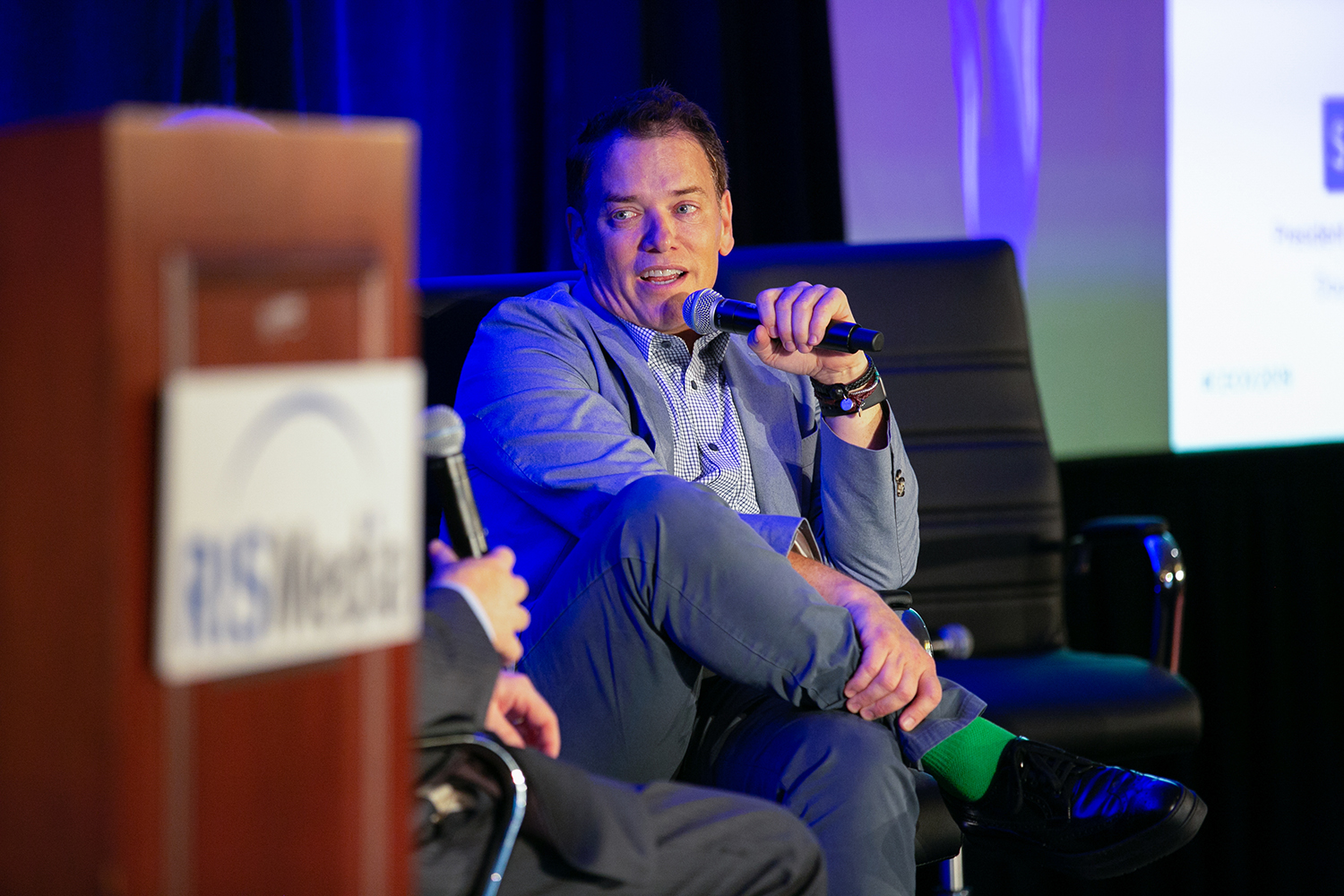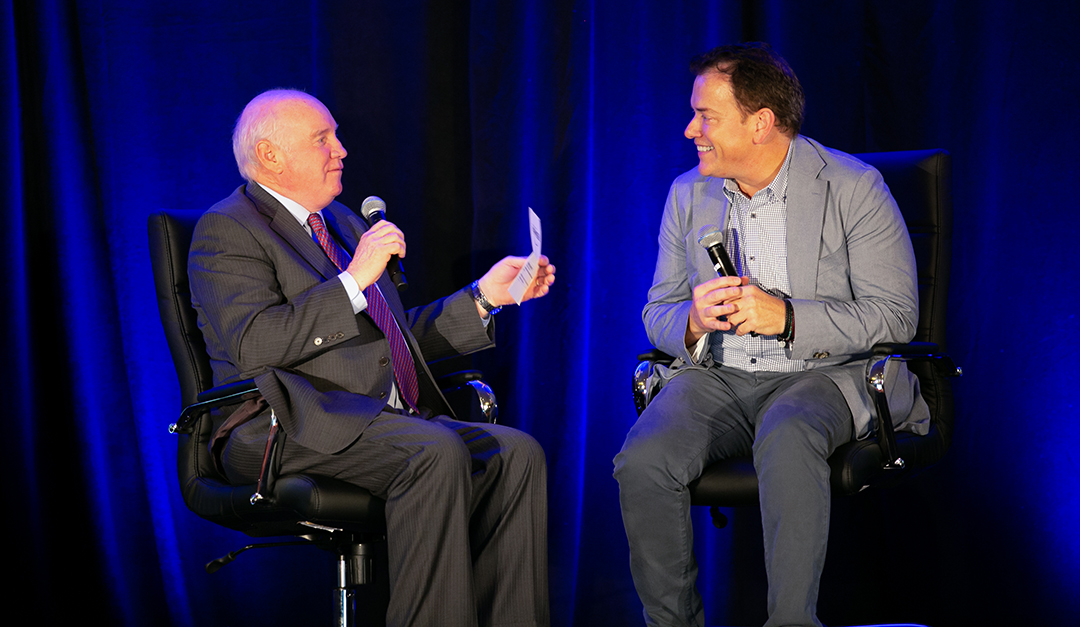(Above) In a broker one-on-one, John Featherston, RISMedia, and Scott Durkin, Douglas Elliman Real Estate, discuss “Competing With a New Rule Book” at RISMedia’s 2019 Real Estate CEO Exchange. (Credit: Korin Krossber of PlanOmatic)
As president and COO of Douglas Elliman Real Estate, Scott Durkin is a driving force behind the globally recognized brokerage’s ranking as the second-largest independent residential real estate firm in the United States. While his meteoric rise at the New York City-based firm began when he was hired as executive vice president in January 2016 as part of the company’s effort to grow a nationwide presence, Durkin has learned from some of the most successful and interesting icons in the industry, including Barbara Corcoran, Dottie Herman and Howard Lorber.
Last month, during RISMedia’s 2019 Real Estate CEO Exchange, RISMedia President and CEO John Featherston sat down for a candid conversation with Durkin, where the two discussed the challenges associated with the Brooklyn/Manhattan market, how technology fits into the mix and the importance of managing your time to get the most out of your day.
Here are some of the highlights from their conversation, “Competing With a New Rule Book.” Held at the New York Marriott Marquis in the heart of Times Square, the event brought together more than 300 brokerage executives and industry leaders for a high-level meeting of the minds.

Scott Durkin, Douglas Elliman Real Estate, at the CEO Exchange (Credit: Korin Krossber of PlanOmatic)
John Featherston: Scott, many real estate professionals agree with your Chairman Howard Lorber’s statement that technology is an aid to one’s business, not a substitute. In your role as president and COO, how do you see technology fitting in?
Scott Durkin: Technology is the engine that runs your business, not you. You can’t say, “I’m a gigabyte, I’m pretty great.” While technology helps you get in front of customers and clients more so than ever before, I can’t imagine a piece of software that will make you better in front of the customer than yourself. In fact, it’s the technology that keeps the engine revved up and going. We service all of our agents through our very own agent app and Douglas Elliman platform, both of which are used to enhance our agents’ business, not take the place of them. All in all, the technology piece is exciting, but in the end, it’s important to remember that real estate is all about relationships. Your clients ultimately have to trust and like you in order to work with you—and there’s no technology that can replace that.
JF: Many agree that compared to 25 years ago, technology can be considered a barrier of entry into the real estate industry. While you have to have a great understanding of how to apply the various tools and technology available today, how is your company making a difference in this regard?
SD: Technology is not a one-size-fits-all solution, and we make it a point to provide our agents with the platform, education and support that makes all the difference when it comes to ensuring that technology isn’t seen as a barrier of entry within our organization. While we have a presence in nine regions across the country, there are a variety of ways to get comps in the Brooklyn/Manhattan market alone—and not having an MLS is certainly a barrier of entry in this town, so having technology on hand is key for us. With a fixed amount of money to be spent on technology, we offer our agents a variety of proprietary tools, but we’re not basing our entire business on this one area alone.
JF: I had the opportunity to speak with a group of your brokers not too long ago about technology and the challenges associated with not having an MLS in the Brooklyn/Manhattan market. Can you talk about some of the difficulties this presents when faced with creating CMAs?
SD: Everyone uses the CMA as a leave-behind, but in our market, it’s more about connecting with the customer, as the client typically knows who you are. Therefore, the CMA isn’t as important for us as the dialogue or what we’re going to talk about. Real estate professionals need to understand that it’s a performance—and it’s not easy. Since we don’t have an MLS, agents need to know the market in order to prepare for client meetings. Sixty percent of our business here is co-op, which is challenging for those trying to find success in this market. It’s not easy, and our deals are often made up of multiple layers. It’s always been a proprietary town, and that’s not going to change.
JF: Do you believe that time is the most valuable asset real estate professionals have? If so, what advice do you have for everyone to manage their time better so that they can create a balanced life and become productive citizens?
SD: No matter the office or market, agents manage their time up to the minute—and if there’s one thing they want to get more of, it’s time. We’ve seen things come full circle, which can be evidenced by the fact that face-to-face interaction is critical if you want to secure a seat at the table today. Successful real estate professionals are no longer sending texts or emails, but rather, they’re evoking the human emotion that’s largely been ignored within the current environment. This is especially true among millennials because social interaction hasn’t necessarily been instilled in them. We’re also seeing Gen Z come full circle as they learn how to interact and be more social. What it all boils down to is the fact that top agents are always on the phone. It can even be said that the agent that’s texting might not be doing as well as the agent that’s talking.
JF: Getting back to the basics, the basis of communication is more or less verbal. While verbal communication resonates more with prospects and customers, in what other ways do verbal skills help agents improve their value proposition across the board?
SD: When agents are faced with a price reduction or counteroffer in the middle of a deal, they’re not going to pick up their phone and shoot off a quick email or text to get the issue resolved. Instead, they’re going to call their client and discuss what’s happening so that they can reach a resolution. If you want to find success, you have to win the moment, and the only way to win the moment is through verbal communication. As the future unfolds, real estate professionals are going to have to be involved and present with people who may be half their age, which makes it even more critical to have open lines of verbal communication.
JF: Scott, you represent the next generation of leadership in this industry. How do you move the ball forward without adversely affecting what has already been established?
SD: In addition to looking cool and dressing in the same manner as the kids do today, creating a viable culture is paramount to moving the ball forward. In fact, culture is the glue that holds an organization together, so if agents stay because of that, that’s great. While we can’t change the way we transact business, we can change the way we get there and get through it.
For CEO Exchange continuing coverage, visit RISMedia.com.
 Paige Tepping is RISMedia’s managing editor. Email her your real estate news ideas at paige@rismedia.com.
Paige Tepping is RISMedia’s managing editor. Email her your real estate news ideas at paige@rismedia.com.












